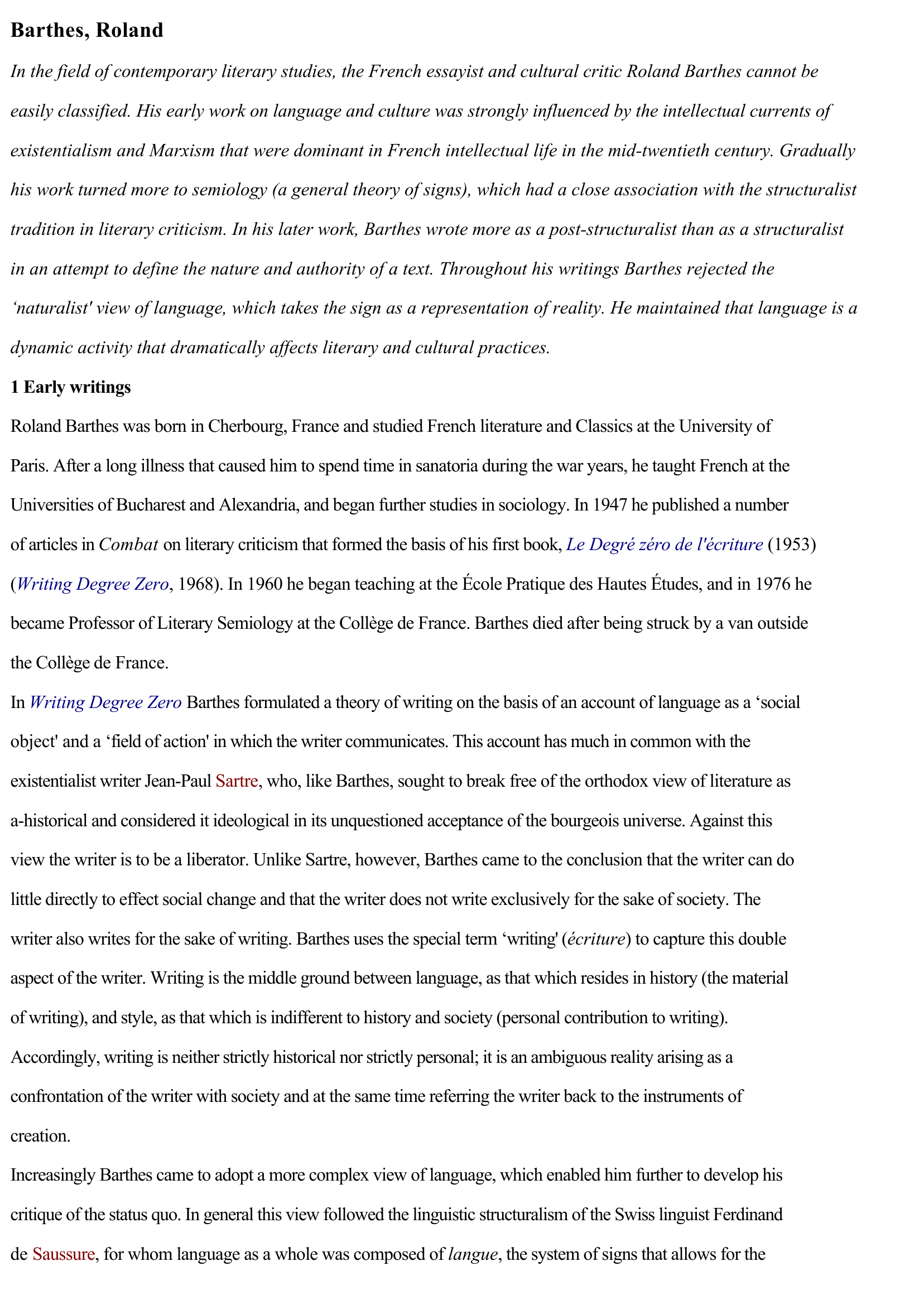Barthes, Roland
Publié le 16/05/2020

Extrait du document
«
Barthes, Roland
In the field of contemporary literary studies, the French essayist and cultural critic Roland Barthes cannot be
easily classified.
His early work on language and culture was strongly influenced by the intellectual currents of
existentialism and Marxism that were dominant in French intellectual life in the mid-twentieth century.
Gradually
his work turned more to semiology (a general theory of signs), which had a close association with the structuralist
tradition in literary criticism.
In his later work, Barthes wrote more as a post-structuralist than as a structuralist
in an attempt to define the nature and authority of a text.
Throughout his writings Barthes rejected the
‘naturalist' view of language, which takes the sign as a representation of reality.
He maintained that language is a
dynamic activity that dramatically affects literary and cultural practices.
1 Early writings
Roland Barthes was born in Cherbourg, France and studied French literature and Classics at the University of
Paris.
After a long illness that caused him to spend time in sanatoria during the war years, he taught French at the
Universities of Bucharest and Alexandria, and began further studies in sociology.
In 1947 he published a number
of articles in Combat on literary criticism that formed the basis of his first book, Le Degré zéro de l'écriture (1953)
(Writing Degree Zero , 1968).
In 1960 he began teaching at the École Pratique des Hautes Études , and in 1976 he
became Professor of Literary Semiology at the Collège de France.
Barthes died after being struck by a van outside
the Collège de France.
In Writing Degree Zero Barthes formulated a theory of writing on the basis of an account of language as a ‘social
object' and a ‘field of action' in which the writer communicates.
This account has much in common with the
existentialist writer Jean-Paul Sartre , who, like Barthes, sought to break free of the orthodox view of literature as
a-historical and considered it ideological in its unquestioned acceptance of the bourgeois universe.
Against this
view the writer is to be a liberator.
Unlike Sartre, however, Barthes came to the conclusion that the writer can do
little directly to effect social change and that the writer does not write exclusively for the sake of society.
The
writer also writes for the sake of writing.
Barthes uses the special term ‘writing' (écriture ) to capture this double
aspect of the writer.
Writing is the middle ground between language, as that which resides in history (the material
of writing), and style, as that which is indifferent to history and society (personal contribution to writing).
Accordingly, writing is neither strictly historical nor strictly personal; it is an ambiguous reality arising as a
confrontation of the writer with society and at the same time referring the writer back to the instruments of
creation.
Increasingly Barthes came to adopt a more complex view of language, which enabled him further to develop his
critique of the status quo.
In general this view followed the linguistic structuralism of the Swiss linguist Ferdinand
de Saussure , for whom language as a whole was composed of langue , the system of signs that allows for the.
»
↓↓↓ APERÇU DU DOCUMENT ↓↓↓
Liens utiles
- Depuis les temps anciens jusqu'aux tentatives de l'avant-garde, la littérature s'affaire à représenter quelque chose. Quoi ? Je dirai brutalement : le réel. Le réel n'est pas représentable et c'est parce que les hommes veulent sans cesse le représenter par des mots, qu'il y a une histoire de la littérature [...] ou pour mieux dire des productions de langage, qui serait l'histoire des expédients verbaux, souvent très fous pour réduire, apprivoiser, nier, ou au contraire assumer ce qui e
- Dans son essai critique Sur Racine, Roland Barthes qualifie Bérénice de « tragédie de l'aphasie » ; Jean Starobinski, quant à lui, souligne « que dans le théâtre français classique, et singulièrement chez Racine, les gestes tendent à disparaître au profit du langage, il faut ajouter au profit du regard. Les scènes chez Racine sont des « entrevues ». Les personnes du drame se parlent et s'entre-regardent mais les regards échangés ont valeur d'étreinte et de blessure... Ils troublent les
- Un fléau est comme un test expérimental qui nous permet de voir réagir une humanité moyenne et nullement héroïque écrivait le penseur Roland Barthes, en 1955.Partagez-vous ce jugement ?
- Dans un article de 1968 intitulé La mort de l'auteur, le critique Roland Barthes écrit: L'image de la littérature que l'on peut trouver dans la culture courante est tyranniquement centrée sur l'auteur, sa personne, son histoire, ses goûts, ses passions. En vous appuyant sur les documents fournis, les textes étudiés en classe et vos lectures (et/ou expériences) personnelles, vous discuterez ce jugement ?
- Roland Barthes a écrit à propos de Voltaire : «Nul mieux que lui n'a donné au combat de la Raison l'allure d'une fête». Candide, le conte philosophique le plus célèbre de Voltaire illustre-t-il selon vous cette analyse ?


